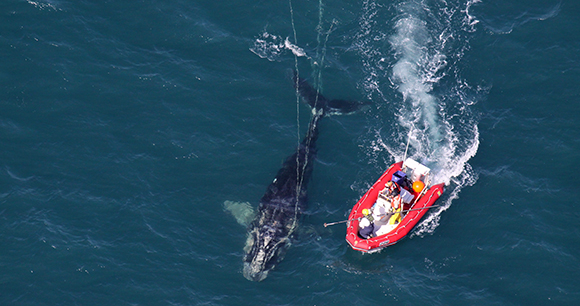
Washington, DC—Sixty-six marine conservation organizations, animal protection organizations, and leading academics recently issued a joint letter to Marine Stewardship Council (MSC) chair Werner Kiene, criticizing the MSC for its failure to improve the label’s Principle 2 (“Environmental and Ecological Impacts”) standards.
In the letter, the signatories condemned the MSC for awarding an increasing number of certifications to fisheries that catch thousands of vulnerable and endangered animals and irreversibly harm vulnerable ocean habitats. This practice, the letter notes, brings into question the credibility of the MSC and misleads consumers who trust the “certified sustainable” label when purchasing seafood.
“The cumulative impacts of fisheries on all species caught, including nontarget or bycatch species, must be assessed,” said Dr. Cat Dorey, a fisheries specialist from Australia. “If fisheries interfere with the recovery of endangered species, they should not qualify for sustainable certification, regardless of whether that species is the target for the fishery. We think most consumers would agree.”
One of the key issues raised by the letter relates to this lack of concern and attention given to the protection of species outside those that are being intentionally targeted by a given fishery. Too often, the MSC assessment and audit process ignores the impact of a fishery on vulnerable species, accepting minor “paper” changes to mitigate harm rather than insist on real, demonstrable changes on the water.
“Lobster and trap fisheries, which overlap with the range of North Atlantic right whales, have been responsible for a number of deaths of these critically endangered animals,” said Kate O’Connell, marine wildlife consultant for the Animal Welfare Institute. “Yet these fisheries remain MSC certified, a clear sign that the standards as currently written are failing.”
The groups hope that the MSC views the letter as an opportunity to accept feedback from a wide range of well-known and respected organizations from across the globe, in order to improve MSC standards and their credibility as the leading seafood certifier in the world. The letter also requests that the MSC
- forego assessment of any fisheries involved in the deliberate setting of nets on marine mammals, as well as endangered, threatened and protected species;
- adhere to a strict “fins naturally attached” policy for fisheries that interact with sharks; and
- deny certification to bottom fisheries within vulnerable marine ecosystems.
While the letter acknowledges that the MSC responded to some stakeholder concerns, it highlights a number of major weaknesses that remain in the certification process and require urgent attention.
“None of the issues we’ve raised are new, nor is the MSC unaware of our concerns. What is new is the urgency we feel, given the Council’s stated goal of certifying 20 percent of global fisheries by 2020,” said Dr. Iris Ziegler of Sharkproject. “Without swift changes to its standards and processes, the MSC runs the risk of being identified as contributing to the problem of unsustainable fishing and misleading consumers, rather than being a solution and a truly sustainable choice.”
An annex to the letter elaborates on the critical weaknesses in the MSC system that allow fisheries accompanied by significant conservation concerns to be certified as sustainable. Case studies are included to underscore the nature and extent of the coalition’s concerns. Throughout 2017, MSC also received numerous communications urging that the organization strengthen its standards and assessment process.
To view the letter, visit https://awionline.org/sites/default/files/uploads/documents/temp/AWI-ML-Open-Letter-to-MSC-012018.pdf.
Amey Owen, (202) 446-2128, [email protected]